Patrick Geddes: Pioneer Landscape Architect and Town Planner
Patrick Geddes was more of a Landscape Architect than a Town Planner
Patrick Geddes was a Scottish biologist, sociologist, landscape architect and town planner. His approach to cities and landscapes was closer to contemporary landscape architecture than to contemporary town planning and he was, in fact, the first UK citizen to use ‘landscape architect’ in its current professional sense [see LAA article on The Origins of Landscape Architecture]. Geddes us of the term was bound up with the approach which he called ‘Civics’. It combined
- Regional Survey: A comprehensive study of a region, including its geography, history, economy, and culture.
- Civic Survey: A detailed analysis of a city or town, focusing on its physical, social, and economic aspects.
- Civic Design: The creation of plans for urban development, incorporating both functional and aesthetic considerations.
- Civic Education: The education of citizens about their city and their role in its development.
Geddes believed that understanding the past and present of a city was essential for shaping its future. He emphasized the importance of local knowledge and community involvement in the planning process.
The Outlook Tower
In Edinburgh, Geddes established the Outlook Tower, a unique institution that embodied his civic philosophy. It served as a centre for research, education, and public engagement. The tower offered panoramic views of Edinburgh and hosted exhibitions, lectures, and workshops.
Key Principles of Geddes’s Urban Theory
- Regionalism: Recognizing the interdependence of cities and their surrounding regions.
- Conservation: Preserving the historical and cultural heritage of cities.
- Community Involvement: Empowering local communities to participate in decision-making.
- Functional Zoning: Organizing cities into distinct zones for different activities.
- Green Spaces: Emphasizing the importance of parks and open spaces.
Geddes’s ideas have had a lasting impact on urban planning and have influenced the work of many subsequent thinkers and practitioners. His emphasis on the human dimension of cities and his commitment to sustainable development continue to be relevant today.

